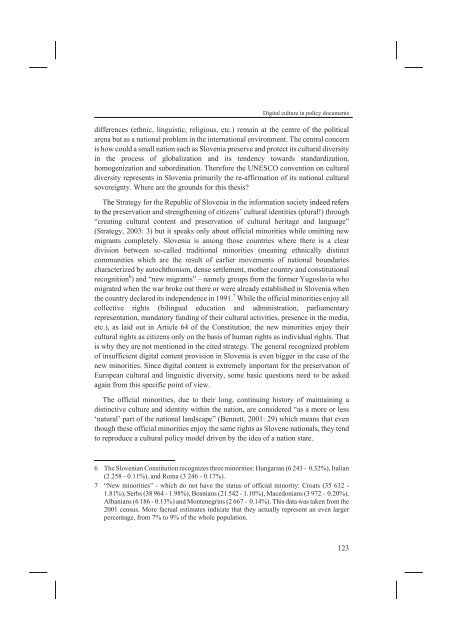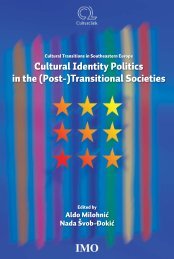D:\Documents and Settings\Ana\My Documents\Biserka-knjiga ...
D:\Documents and Settings\Ana\My Documents\Biserka-knjiga ...
D:\Documents and Settings\Ana\My Documents\Biserka-knjiga ...
Create successful ePaper yourself
Turn your PDF publications into a flip-book with our unique Google optimized e-Paper software.
Digital culture in policy documents<br />
differences (ethnic, linguistic, religious, etc.) remain at the centre of the political<br />
arena but as a national problem in the international environment. The central concern<br />
is how could a small nation such as Slovenia preserve <strong>and</strong> protect its cultural diversity<br />
in the process of globalization <strong>and</strong> its tendency towards st<strong>and</strong>ardization,<br />
homogenization <strong>and</strong> subordination. Therefore the UNESCO convention on cultural<br />
diversity represents in Slovenia primarily the re-affirmation of its national cultural<br />
sovereignty. Where are the grounds for this thesis?<br />
The Strategy for the Republic of Slovenia in the information society indeed refers<br />
to the preservation <strong>and</strong> strengthening of citizens’ cultural identities (plural!) through<br />
“creating cultural content <strong>and</strong> preservation of cultural heritage <strong>and</strong> language”<br />
(Strategy, 2003: 3) but it speaks only about official minorities while omitting new<br />
migrants completely. Slovenia is among those countries where there is a clear<br />
division between so-called traditional minorities (meaning ethnically distinct<br />
communities which are the result of earlier movements of national boundaries<br />
characterized by autochthonism, dense settlement, mother country <strong>and</strong> constitutional<br />
recognition 6 ) <strong>and</strong> “new migrants” – namely groups from the former Yugoslavia who<br />
migrated when the war broke out there or were already established in Slovenia when<br />
the country declared its independence in 1991. 7 While the official minorities enjoy all<br />
collective rights (bilingual education <strong>and</strong> administration, parliamentary<br />
representation, m<strong>and</strong>atory funding of their cultural activities, presence in the media,<br />
etc.), as laid out in Article 64 of the Constitution, the new minorities enjoy their<br />
cultural rights as citizens only on the basis of human rights as individual rights. That<br />
is why they are not mentioned in the cited strategy. The general recognized problem<br />
of insufficient digital content provision in Slovenia is even bigger in the case of the<br />
new minorities. Since digital content is extremely important for the preservation of<br />
European cultural <strong>and</strong> linguistic diversity, some basic questions need to be asked<br />
again from this specific point of view.<br />
The official minorities, due to their long, continuing history of maintaining a<br />
distinctive culture <strong>and</strong> identity within the nation, are considered “as a more or less<br />
‘natural’ part of the national l<strong>and</strong>scape” (Bennett, 2001: 29) which means that even<br />
though these official minorities enjoy the same rights as Slovene nationals, they tend<br />
to reproduce a cultural policy model driven by the idea of a nation state.<br />
6 The Slovenian Constitution recognizes three minorities: Hungarian (6 243 - 0.32%), Italian<br />
(2 258 - 0.11%), <strong>and</strong> Roma (3 246 - 0.17%).<br />
7 “New minorities” - which do not have the status of official minority: Croats (35 632 -<br />
1.81%), Serbs (38 964 - 1.98%), Bosnians (21 542 - 1.10%), Macedonians (3 972 - 0.20%),<br />
Albanians (6 186 - 0.13%) <strong>and</strong> Montenegrins (2 667 - 0.14%). This data was taken from the<br />
2001 census. More factual estimates indicate that they actually represent an even larger<br />
percentage, from 7% to 9% of the whole population.<br />
123



